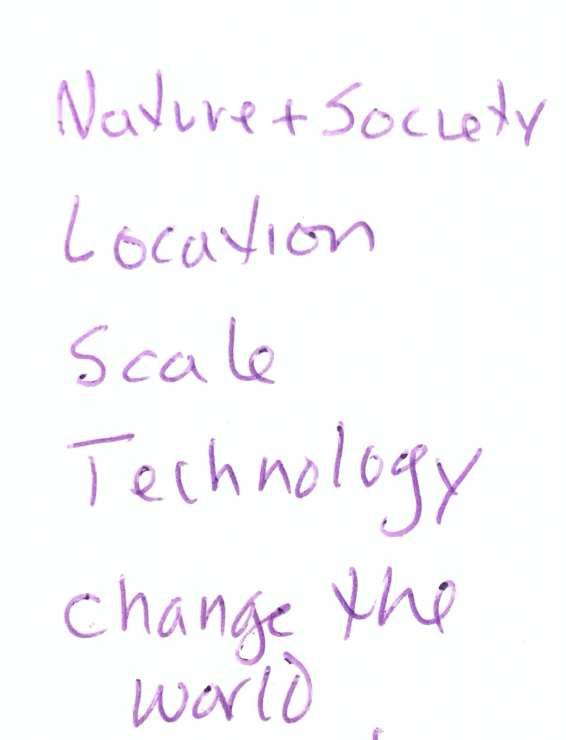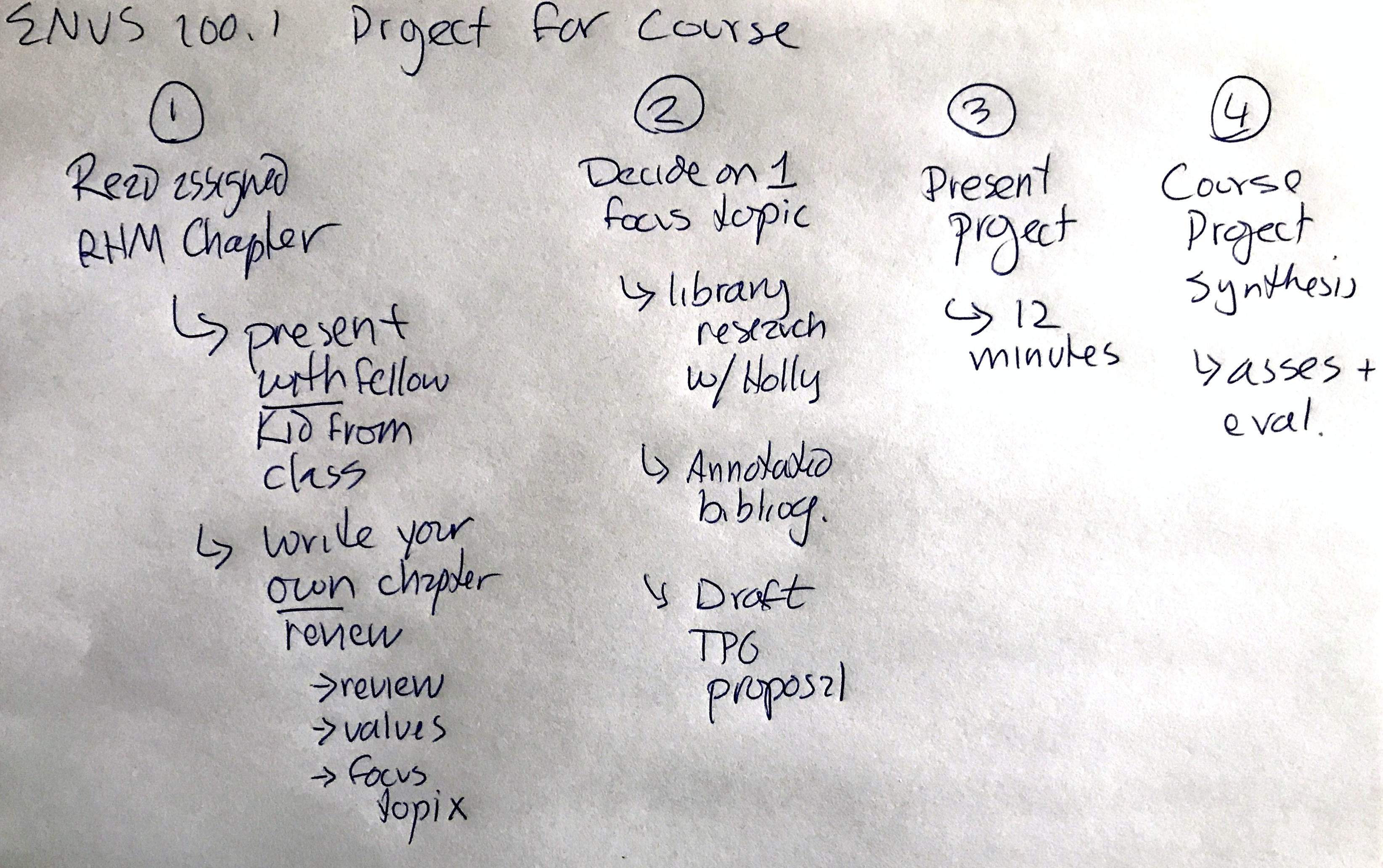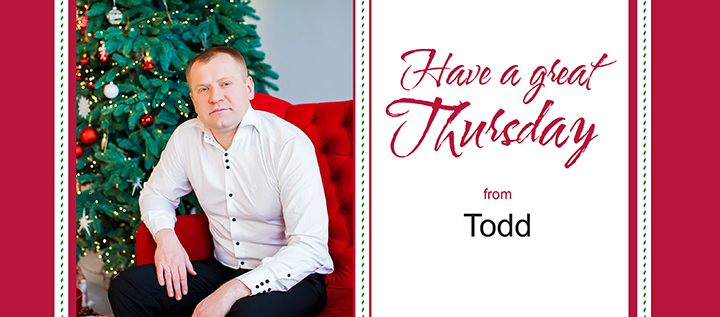
Where it started…

Book Learnins’
Think: different approaches to environment & sustainability (first half of RHM text):
- concepts that focus and organize and enable action
- Population & Scarcity
- Markets & Commodities
- Institutions & the Commons
- Environmental Ethics
- Risks & Hazards
- Political Economy
- Social Construction of Nature
- Feminism & the Environment
- Racialized Environments
Then apply those concepts to understanding stuff in the environment (second half of RHM text)
-
- Carbon Dioxide
- Trees
- Wolves
- Uranium
- Tuna
- Lawns
- Bottled Water
- French Fries
- E-Waste
Then the research process…

How to do something: Propose a fundable project developed as a research project
Some pearls of wisdom:
Understand what theory-into-practice and the OWU Connection are about: the focus of the course is how to make this all work for you (whether you do it sooner or later).
-
- 90% of undergrads don’t have access to these kinds of opportunities.
Keep trying to understand your personal values (environmental and otherwise) and how they apply to all of this.
-
- Use it to shape what you do – now and in the future.
Work to find something you are interested in and excited to do.
-
- pay attention to brain wiggles
- if you are not finding inspiration, look elsewhere
Read and learn and talk about concepts and ideas – like those we explored in the first part of the class text.
-
- These are the big ideas that shape how you think about what you are doing.
Learning vs. creating knowledge: Many courses focus on learning what is already known; in this class, we also look at the steps towards creating your own knowledge or a real-world application (or at least proposing to do so).
Learn the process and the important aspects of each step, from idea generation to a draft TPG and presentation.
Agency and Engagement: It’s relatively easy to be passive in your education. TPG and the OWU Connection, and the process from this class give you agency to actively shape your education and future.
Don’t get bogged down: Do something: it need not be perfect; everything you ever dreamed of, your ultimate life’s goals.
-
- Just do something. Then do something more.
Snag Opportunities: even if a project or collaborator, or internship may not be ideal or perfect (whatever that means) take advantage of the opportunity.
Collaboration: find and use the right collaborators: faculty, librarians, writing center, OWU Career Connection, experts elsewhere (places you want an internship), other students, etc.
Figure out what you need to know to do what you want: courses, but sometimes what you need to know is not in a course.
-
- Alternatives: directed readings and independent studies, online courses and learning (use OWU Connection funds if there is a cost), read books, talk to people.
- But also: find collaborators that fill in your gaps in knowledge and know-how.
It’s Going to take Time: a couple of semesters, years…
Make Time for this work
-
- It is at least as important as taking classes
- You will have a tough time making a TPG work if you don’t work it into your schedule
- For credit work (all majors have these options)
- ENVS 490: Independent Study
- ENVS 491: Directed Readings
- ENVS 495: Internship
- For credit work (all majors have these options)
- If possible, work parts of your efforts into projects in other courses
Learning this process is confusing, complicated, and can be frustrating.
Why do it?
- Problem Solving: Identifying a research question, focusing it, and developing a proposal requires a systematic approach to problem-solving that’s applicable in any field.
- Information Literacy: Learning to work with a science librarian and conduct a thorough literature review equips them with crucial skills for navigating and evaluating information, vital in a world saturated with data.
- Critical Thinking: Analyzing sources critically and providing annotated bibliographies hones their ability to evaluate information, identify biases, and form well-supported arguments – essential for informed decision-making in any career or personal endeavor.
- Written Communication: Crafting a clear and concise research proposal strengthens their ability to communicate complex ideas effectively in writing, a skill highly valued in professional settings (reports, memos, emails, etc.).
- Oral Communication & Presentation Skills: Delivering a 15-minute presentation builds confidence and proficiency in public speaking, a key skill for sharing ideas, advocating for projects, and leading teams.
- Project Management Basics: Understanding the steps involved in a research project – from ideation to proposal – provides a foundational understanding of project management principles applicable to various tasks and roles.
- Collaboration: Working with you and the librarian fosters collaboration and the ability to seek and incorporate feedback, crucial skills for teamwork in any professional environment.
- Persuasion & Argumentation: Writing a compelling research proposal involves persuasive writing and constructing logical arguments to convince reviewers of the project’s merit – skills transferable to sales, marketing, policy advocacy, and more.
- Intellectual Curiosity & Lifelong Learning: The process encourages them to delve deeply into a topic that interests them, fostering intellectual curiosity and the ability to independently learn and explore new areas throughout their lives.
- Adaptability & Resilience: Navigating the challenges of the research process, including critical feedback, builds resilience and adaptability – essential for navigating the inevitable hurdles in any career path.
And what do you do with this all in the future?
- Research Scientist/Technician: The entire process mirrors the initial stages of research in academic, government, or industry labs, from identifying research gaps to designing experiments and seeking funding.
- Grant Writer/Development Officer: Directly applies the skills of literature review, proposal writing, and persuasive communication needed to secure funding for non-profit organizations, universities, hospitals, and other institutions.
- Policy Analyst: The ability to research, critically evaluate information, and present well-supported arguments is crucial for analyzing policy issues and developing recommendations.
- Environmental Consultant: Requires strong research skills to assess environmental impacts, gather data, and write reports and proposals for clients.
- Science Communicator/Journalist: The ability to understand complex scientific information, evaluate sources, and communicate it clearly and engagingly to a wider audience is essential.
- Project Manager: The structured approach to the research project, including planning, literature review (understanding the existing landscape), and proposal development, provides a foundation for managing projects in various sectors.
- Market Research Analyst: Involves identifying research questions, conducting literature reviews (analyzing market trends), and presenting findings to inform business decisions.
- Technical Writer: Requires the ability to understand complex technical information, research it thoroughly, and present it clearly and concisely in reports, manuals, and other documents.
- Librarian/Information Specialist: The experience of working closely with a science librarian and conducting in-depth literature reviews provides valuable insight into information organization and retrieval.
- Educator (various levels): The ability to research, synthesize information, and present it effectively is fundamental to teaching and curriculum development.
- Non-profit Program Manager: Often involves identifying community needs, researching best practices, and writing proposals to secure funding for programs.
- Business Analyst: Requires the ability to identify business problems, research potential solutions, and present recommendations to stakeholders.
- Advocacy Roles: Whether for environmental causes or other issues, the ability to research, build strong arguments based on evidence, and present them persuasively is key.
- Science Museum/Outreach Coordinator: Involves researching scientific topics and developing engaging presentations and materials for public audiences.
Have a great Thursday!
